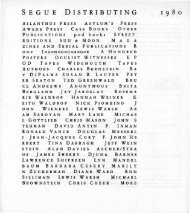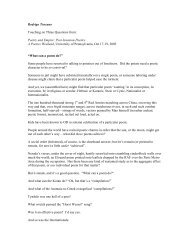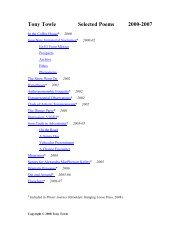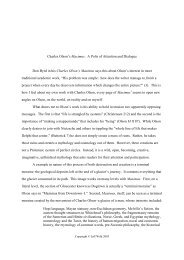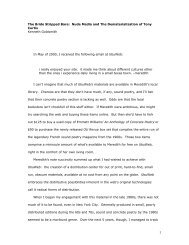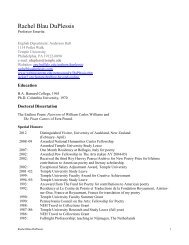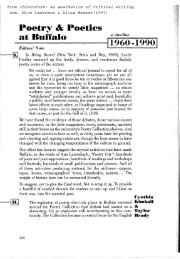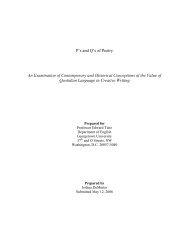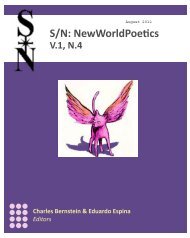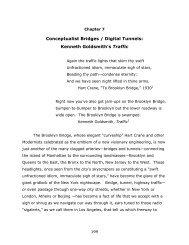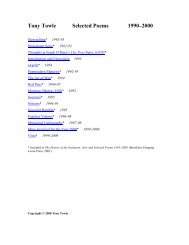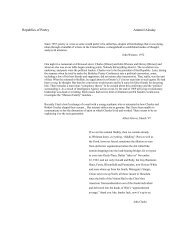Preface - Electronic Poetry Center
Preface - Electronic Poetry Center
Preface - Electronic Poetry Center
You also want an ePaper? Increase the reach of your titles
YUMPU automatically turns print PDFs into web optimized ePapers that Google loves.
From: Ron Silliman<br />
Subject: Motivation<br />
What I like about Social Formalism is that it combines both the general thrust<br />
of the activity with the general thrust of the motivation for such activity, i.e.,<br />
that these writings are/were motivated for explicitly social reasons, even where<br />
(as often enough was the case) the definition of the social reason would have<br />
been hard to get at beyond "general sense of dissatisfaction w/ the present<br />
condition of things"<br />
What separates most of the writers in In the American Tree, for example, from<br />
poets now ages 25-30 doing superficially similar things on a page, is precisely<br />
that sense of motivation. Not that younger poets don’t have motivation, but it’s<br />
a different one, generally. And the fact that something like LangPo sits owl-like<br />
on the landscape is part of the problem any younger poet must thus face.<br />
The impulse to write in the way that, say, Stephen Rodefer did 10 years ago, is<br />
not the same today. Even for Stephen.<br />
I actually think that is why in the O-blek anthology we see such a "return to the<br />
lyric" as a mode. It represents precisely the draining of the "social" from that<br />
equation.<br />
Which may be why, w/ the exception of Mark Mendel’s appropriation of Jenny<br />
Holzer’s sense of display for poetry, there are no literary devices in that<br />
collection that you cannot already find in The New American <strong>Poetry</strong>, In the<br />
American Tree or The Art of Practice.<br />
"Experimental poetry" I think tries as a category to express the same<br />
combination of activity & motivation, but both terms in the equation seem too<br />
vague ultimately. And I do think that for many poets, esp. during the 1950s, the<br />
first term in that category carried with it some connotation of the "prestige of<br />
science" – Think of Bern Porter, or even Kostelanetz. Or Eli Mandel, who went<br />
from "Hot Afternoons Have Been in Montana" (one of the interesting attempts<br />
at the American long poem during the so-called modernist era which has not<br />
made it even into the most retro canon as yet)to true crackpot science "curing<br />
gays of homosexuality" on the right-wing homophobe circuit before he died.<br />
Zukofsky has that same sense of wearing the lab coat at the blackboard. The<br />
Doctor will see you now.



